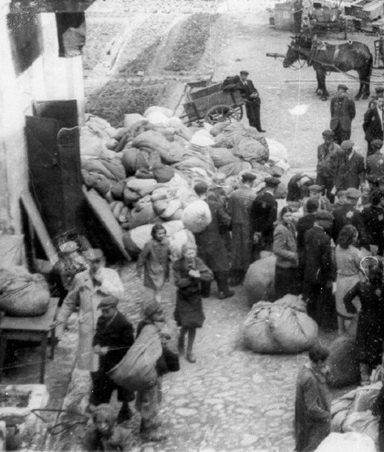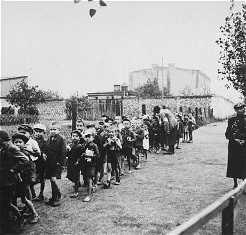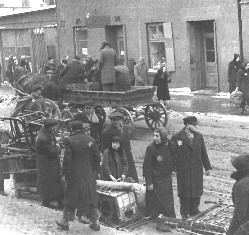Chaim Mordechai Rumkowski The Holocaust Education & Archive Research Team holds no viewpoint on the actions of Mordechai Chaim Rumkowski. We only seek to present the factual events from several viewpoints and allow the reader to formulate their own views. |
Mordechai Chaim Rumkowski was born in 1877 in Russia. His family relocated to Poland where he maintained an unsuccessful career as the director of an orphanage. On October 13, 1939, the Nazi occupation authorities appointed him Judenrat Chairman in Łódź. In this position he reported directly to the Nazi ghetto administration headed by Hans Biebow and had direct responsibility for providing heat, work, food, housing, and health and welfare services to the ghetto population. With 230,000 people confined to a very small area that had no farmland, food quickly became a problem. Since the Nazis insisted on having the ghetto pay for its own upkeep, money was needed. But how could Jews who were locked away from the rest of society and who had been stripped of all valuables make enough money for food and housing? Rumkowski believed that if the ghetto was transformed into an extremely useful workforce, then the Jews would be needed by the Nazis. Rumkowski believed that this usefulness would ensure that the Nazis would supply the ghetto with food. On April 5, 1940, Rumkowski petitioned the Nazi authorities requesting permission for his work plan. He wanted the Nazis to deliver raw materials, have the Jews make the final products, then have the Nazis pay the workers in money and in food. On April 30, 1940 Rumkowski's proposal was accepted with one very important change - the workers would only be paid in food. It's to be noted however, that no agreement was put forth upon how much food, nor how often it was to be supplied. Rumkowski immediately began setting up factories and all those able and willing to work were found jobs. Most of the factories required workers to be over fourteen years old but often very young children and older adults found work in mica splitting factories. Adults worked in factories that produced everything from textiles to munitions. Young girls were even trained to hand stitch the emblems for the uniforms of German soldiers. Rumkowski also managed social events. He performed marriage ceremonies when rabbis had to stop working. Later his name came to serve as the nickname of the ghetto currency, the “Rumkie”, and his face even appeared on the ghetto postage-stamps. Some historians and writers see him as a traitor and as a Nazi collaborator. In all his activities, Rumkowski displayed great zeal and organizational ability, becoming increasingly dictatorial and ruling with an iron hand. However there are those who see Chairman Rumkowski as a tragic hero who did only what anyone else would do in the same circumstances. Certainly, Nazi persecution did not stop because of Rumkowski's efforts. Even from the beginning, the Germans murdered Jews at random; more simply starved to death. Meanwhile, Rumkowski presided over the ghetto with what seemed to be growing self-aggrandizement. He encouraged artists to memorialize him; he appeared to revel in power. At the same time, he saw himself as ''a fatherly savior.'' Rumkowski’s style can be evidenced in his “Announcements” as seen here:
------------------------------------------------------------------------------------------------ Announcement No. 166 Concerning work outside the ghetto. "I am hereby announcing that healthy, strong men, age 18 to 40 can get work outside of the ghetto. They will receive salary, accommodation and full board for their work. The costs for board will be deducted from their salary. The rest of the salary the can send to their families in the ghetto. This work program is relief for the unemployed, because: They are being offered an opportunity to work and to make money. They will have enough to eat, because they will receive full board. They can support their families in the ghetto.
They are allowed to let their families in the ghetto have the surplus of their earnings. My account will be credited with the money I will disburse those whose names the workers give me in writing. Therefore, if a worker wants to have money transferred here for his relatives, he must always specify the person to whom the money should be paid out. According to the negotiations with the German authorities, healthy strong men will be registered, and then examined by a medical commission I will appoint. Afterwards they will be examined again by German doctors, since only men who are physically fit are suitable. Registration and examination of the workers will begin on Sunday, November 24, 1940 at 4 P.M, at my ambulatory office, Hanseaten St. 36. For the time being, only 600 workers will be accepted. Personal Identity card with photograph, passport, birth certificate, health insurance coupons or ID must be brought along. Persons without proper identification will not be accepted. Ch. Rumkowski The Eldest of the Jews In Litzmannstadt Nov 19, 1940 ------------------------------------------------------------------------------------------------ |
By the end of 1941, however, the Nazis had embarked on ''resettlement.'' Jews, told only that they were going elsewhere, were sent to death camps. Quotas were set. Rumkowski protested to the Germans, but was told to select the Jews who would fill the quotas. Who should be chosen? “The elderly and the sick?” “Whole families?” “Perhaps Rumkowski's political opponents?” Whoever was chosen, the quotas would be filled. Rumkowski made his selections. 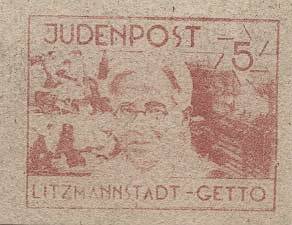
Stamp with Rumkowski Image | 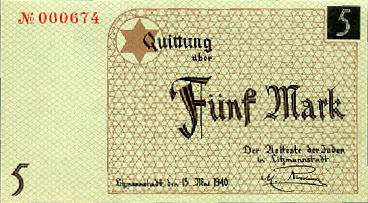
5 Mark "Rumkie" | 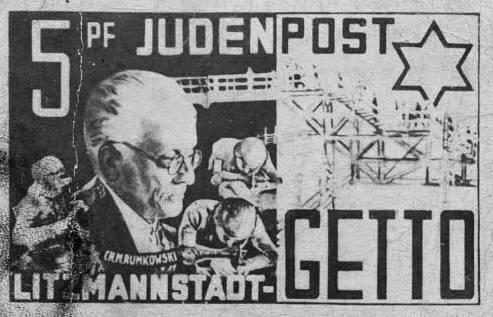
5pf Stamp with Rumkowski image |
It could be argued that he did not initially realize the true mission of the ghetto: a collective staging area for transports to the annihilation camps.
Even while the very first killing center, Chelmno or Kulmhof (German) was established to liquidate the inhabitants of Łódź, Rumkowski was zealously organizing the ghetto to satisfy the demands of the Germans for order as well as quotas for deportations.
He thought that he could insure survival of himself and some part of the ghetto population by producing war-goods for the German Army. In September of 1942 Rumkowski complied with the demand of the Nazis to hand over all children under 10 years of age, all Jews over 65 years and the infirm to the Nazis for deportation (extermination), a combined total of 24.000. From an account by Adam Czerniakow: "It is said that in Łódź, Rumkowski issued his own money, called 'Chaimki'. He is known as 'Chaim the Terrible'." From an account by E. Ringelblum: "Rumkowski from Łódź came today, September 6. They call him 'King Chaim', a seventy-year-old man, overambitious and a bit odd. He told fantastic things about the ghetto. That there is a Jewish state there that has 400 policemen and three prisons. He has a Ministry of Foreign Affairs and all kinds of other ministries." Rumkowski’s “Give me your children” speech. In a compassionate speech to the mothers of the Łódź Ghetto, Rumkowski begged them to hand over their children. The mothers refused. Subsequently in a brutal round-up, 20.000 souls were collected and sent to be murdered in extermination camps. Rumkowski then asked the Council of Rabbis to participate in the deportation selection process. They all refused! --------------------------------------------------------------------------------------------------------------------------------------------------------- The Speech:
"A grievous blow has struck the ghetto. They are asking us to give up the best we possess -the children and the elderly. I was unworthy of having a child of my own, so I gave the best years of my life to children. I've lived and breathed with children, I never imagined I would be forced to deliver this sacrifice to the altar with my own hands. In my old age, I must stretch out my hands and beg: Brothers and sisters! Hand them over to me! Fathers and mothers: Give me your children! I had a suspicion something was going to befall us. I anticipated "something" and was always like a watchman: on guard to prevent it. But I was unsuccessful because I did not know what was threatening us. The taking of the sick from the hospitals caught me completely by surprise. And I give you the best proof there is of this: I had my own nearest and dearest among them and I could do nothing for them! I thought that would be the end of it, that after that, they'd leave us in peace, the peace for which I long so much, for which I've always worked, which has been my goal. But something else, it turned out, was destined for us. Such is the fate of the Jews: always more suffering and always worse suffering, especially in times of war. Yesterday afternoon, they gave me the order to send more than 20,000 Jews out of the ghetto, and if not - "We will do it!” So the question became, 'Should we take it upon ourselves, do it ourselves, or leave it to others to do?". Well, we - that is, I and my closest associates - thought first not about "How many will perish?" but "How many is it possible to save?" And we reached the conclusion that, however hard it would be for us, we should take the implementation of this order into our own hands. I must perform this difficult and bloody operation - I must cut off limbs in order to save the body itself. I must take children because, if not, others may be taken as well - God forbid. I have no thought of consoling you today. Nor do I wish to calm you. I must lay bare your full anguish and pain. I come to you like a bandit, to take from you what you treasure most in your hearts! I have tried, using every possible means, to get the order revoked. I tried - when that proved to be impossible - to soften the order. Just yesterday, I ordered a list of children aged 9 - I wanted at least to save this one aged-group: the nine to 10 year olds. But I was not granted this concession. On only one point did I succeed: in saving the 10 year olds and up. Let this be a consolation to our profound grief.
There are, in the ghetto, many patients who can expect to live only a few days more, maybe a few weeks. I don't know if the idea is diabolical or not, but I must say it: "Give me the sick. In their place we can save the healthy." I know how dear the sick are to any family, and particularly to Jews. However, when cruel demands are made, one has to weigh and measure: who shall, can and may be saved? And common sense dictates that the saved must be those who can be saved and those who have a chance of being rescued, not those who cannot be saved in any case...
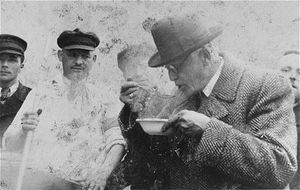
Rumkowksi tasting the ghetto soup |
We live in the ghetto, mind you. We live with so much restriction that we do not have enough even for the healthy, let alone for the sick. Each of us feeds the sick at the expense of our own health: we give our bread to the sick. We give them our meager ration of sugar, our little piece of meat. And what's the result? Not enough to cure the sick, and we ourselves become ill. Of course, such sacrifices are the most beautiful and noble. But there are times when one has to choose: sacrifice the sick, who haven't the slightest chance of recovery and who also may make others ill, or rescue the healthy. I could not deliberate over this problem for long; I had to resolve it in favor of the healthy. In this spirit, I gave the appropriate instructions to the doctors, and they will be expected to deliver all incurable patients, so that the healthy, who want and are able to live, will be saved in their place.
I understand you, mothers; I see your tears, alright. I also feel what you feel in your hearts, you fathers who will have to go to work in the morning after your children have been taken from you, when just yesterday you were playing with your dear little ones. All this I know and feel. Since 4 o'clock yesterday, when I first found out about the order, I have been utterly broken. I share your pain. I suffer because of your anguish, and I don't know how I'll survive this - where I'll find the strength to do so. I must tell you a secret: they requested 24,000 victims, 3000 a day for eight days. I succeeded in reducing the number to 20,000, but only on the condition that these be children under the age of 10. Children 10 and older are safe! Since the children and the aged together equal only some 13,000 souls, the gap will have to be filled with the sick. I can barely speak. I am exhausted; I only want to tell you what I am asking of you: Help me carry out this action! I am trembling. I am afraid that others, God forbid, will do it themselves. A broken Jew stands before you. Do not envy me. This is the most difficult of all orders I have ever had to carry out at any time. I reach out to you with my broken, trembling hands and beg: Give into my hands the victims! So that we can avoid having further victims, and a population of 100,000 Jews can be preserved! So, they promised me: If we deliver our victims by ourselves, there will be peace!!! At this point in the speech the crowd begins shouting. Many cry out: “We will not let the children go alone! We will all go!” Rumkowski continues: These are empty phrases!!! I don't have the strength to argue with you! If the authorities were to arrive, none of you would be shouting! I understand what it means to tear off a part of the body. Yesterday, I begged on my knees, but it did not work. From small villages with Jewish populations of 7000 to 8000, barely 1000 arrived here. So which is better? What do you want? That 80,000 to 90,000 Jews remain, or God forbid, that the whole population be annihilated? You may judge as you please; my duty is to preserve the Jews who remain. I do not speak to hot-heads! I speak to your reason and conscience. I have done and will continue doing everything possible to keep arms from appearing in the streets and blood from being shed. The order could not be undone; it could only be reduced.
One needs the heart of a bandit to ask from you what I am asking. But put yourself in my place, think logically, and you'll reach the conclusion that I cannot proceed any other way. The part that can be saved is much larger than the part that must be given away!"
End Speech |
---------------------------------------------------------------------------------------------------------------------------------------------------------
In August of 1944 Chaim Mordechai Rumkowski voluntarily boarded a train headed for Auschwitz in order to accompany his brother Jozef who was forcibly deported to the death camp. The death of Rumkowski: One widely accepted account is that Rumkowski was beaten to death by one of the Sonderkommando’s in Birkenau, made up of Jews from the Łódź ghetto. His body was believed to have been thrown into an open pit and burned. An excerpt from the book "Defy the Darkness: A Tale of Courage in the Shadow of Mengele," written by survivor Joe Rosenblum, gives the following account of Rumkowski’s fate: As the seemingly never-ending parade of black locomotives chugged to the ramp, I was surprised to see how many people from ghettos or even concentration camps the Germans were piling in. This change raised opportunities for revenge, a chance to pay back the Jews and others who had turned against their own kind to gain an extra slice of bread or a more comfortable bed. The most blatant example I saw occurred in September 1944 when the Jewish policemen from the Polish city of Łódź were brought in. Among them was Chaim Rumkowski, president of the whole ghetto, as Lazar had been in our town. Rumkowski was getting the same reward as Lazar: death. The Łódź Jewish Council, through the Jewish police there, had turned in about fifty Jews who had been underworld members in 1940. These guys had been thugs, thieves, and con men. Like Lazar, they'd have people steal for them, then ransom back the goods. The men had committed all kinds of crimes, except murder. Strangely, in Birkenau they were a closely knit lot, but kindly. A few had become powerful Senior Block Inmates, including Morris the Hasid, to whom I had paid the fifty dollars to get my job with the Czech. There was also Blackie, who got his name because he was so dark-skinned. He had been a thief and a con man in Łódź, but here he was a man whose word was good and who took care of his people. It was Blackie I went to when I wanted a job for someone. I did it so often he once looked at me and asked, "Who else are you going to bring in here? Your uncle? Your cousin? Your nephew? No babies, Joe. I draw the line there. They're too young," he said, his dark skin framing a smile bright enough to light up the sky.
Even though they usually were good people, Morris, Blackie, and the others had vowed revenge on the Jewish policemen who had captured them. One night, the former thieves had their chance. They spotted the Jewish police contingent from Łódź emptying out of one of the cattle cars.
"We're going to have our revenge," Blackie whispered to me. "We're going to get them gassed." The policemen didn't know which line was which. Mengele had put them into the group that was going to live and be shipped off to labor camps. Then a couple of the Łódź underground group, including Blackie, walked over to the Jewish police, looked them in the eye, then pointed over to the death line.
The policemen, not knowing the difference, meekly obeyed and were marched to their death. They joined Rumkowski, who was old and lame, and was being carried to the crematorium on a litter.
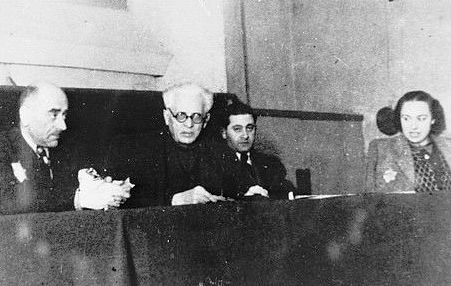
Rumkowski presiding over a meeting in the ghetto |
"Take a look," Blackie whispered to me. "Now he's in a litter. He sent a lot of us to the camps. Lots of us were gassed. It's his turn." Rumkowski didn't know what was happening. He turned to me, of all people, and asked, "What goes on here?" "Can't you smell? Can't you see the fire?" I replied, anger and revenge in my voice for what he had done to my friends. "Where am I?" "Auschwitz." "Oh, my God," he said, smacking his forehead with his palm. Then he started reciting a Jewish prayer as two guards picked up his litter to carry him away.
There he was, a man who had been rich and powerful, in charge of a city out of which had poured the products of enormous factories. He thought he would save himself by doing the Germans' bidding. As they had for Lazar, the Nazis ultimately had more use for him dead than alive. I felt no sympathy, no pain. Rumkowski was a traitor and deserved a traitor's death. Later, I talked to Blackie about what they had done to the Łódź Jewish police. "You did what you did. I guess you had to do it," I told him.
"We were pushed out of the ghetto because we were in the underworld. I didn't know any better. I considered it my job, which I went to while people were sleeping in their beds. But we had a heart, and this guy didn't," Blackie said, looking grim. --------------------------------------------------------------------------------------------------------------------------------- |
Regardless of how Rumkowski met his end, his life and actions will always be viewed with mixed emotions, and controversy.
Sources: The Łódź Ghetto Alan Adelson and Robert Lapides -Penguin Books1991. “Defy the Darkness” A Tale of Courage in the Shadow of Mengele Joe Rosenblum with David Kohn, Praeger Publishers, 2001. Yad Vashem Archives. YIVO Institute for Jewish Research. USHMM. The Holocaust Chronicle Publications International LTD.
Copyright:
Carmelo Lisciotto H.E.A.R.T 2007
|

